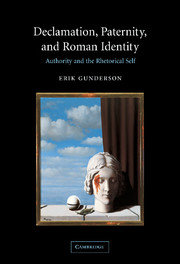Book contents
- Frontmatter
- Contents
- Preface: Acheron
- Introduction: A praise of folly
- PART I WHERE EGO WAS …
- PART II LET ID BE
- 5 An Cimbrice loquendum sit: speaking and unspeaking the language of homosexual desire
- 6 Paterni nominis religio
- By way of conclusion
- Appendix 1 Further reading
- Appendix 2 Sample declamations
- List of references
- Index locorum
- General index
5 - An Cimbrice loquendum sit: speaking and unspeaking the language of homosexual desire
Published online by Cambridge University Press: 10 December 2009
- Frontmatter
- Contents
- Preface: Acheron
- Introduction: A praise of folly
- PART I WHERE EGO WAS …
- PART II LET ID BE
- 5 An Cimbrice loquendum sit: speaking and unspeaking the language of homosexual desire
- 6 Paterni nominis religio
- By way of conclusion
- Appendix 1 Further reading
- Appendix 2 Sample declamations
- List of references
- Index locorum
- General index
Summary
Declamation offers a means for thinking through various problems of Roman social logic. Importantly, declamation is a specifically rhetorical means of carrying out such a labor. Tyrannicides, stern fathers, and raped maidens occasion wordy flights of imagination; by talking through these issues in a forensic fiction one comes to terms with problems of power, authority, violence and sex. The genre itself is implicated in questions of the production and reproduction of normative male identity even as that identity is revealed to be a much more difficult and decentered category than one might otherwise imagine. I would like to examine a specific case wherein Roman national and masculine identity are made to converge over a charge of attempted homosexual rape.
By using “sexual” and “homosexual” throughout this chapter I am by implication diverging somewhat from those scholars who emphasize the category of sexuality as itself constructed, and, for that matter, as very recently constructed. But not only does the imbrication of identity and sexual practice to be found below in fact argue for something like the identitarian regime binding the person to his or her pleasure that is familiar from modernity, but the specific pattern of incitements and prohibitions is neither uncanny nor unfamiliar. Despite the many heuristic advantages of positing discontinuity, perhaps it is time to reinvestigate the common threads that can be found. Specifically, antiquity and modernity each grow very anxious over the question of desire expressed for autonomous adult males.
- Type
- Chapter
- Information
- Declamation, Paternity, and Roman IdentityAuthority and the Rhetorical Self, pp. 153 - 190Publisher: Cambridge University PressPrint publication year: 2003

